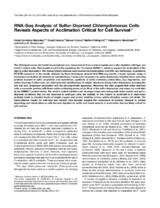RNA-Seq Analysis of Sulfur-Deprived Chlamydomonas Cells Reveals Aspects of Acclimation Critical for Cell Survival
Autor
Casero, David
Cokus, Shawn
Pellegrini, Matteo
Merchant, Sabeeha S.
Grossman, Arthur R.
González-Ballester, David
Editor
American Society of Plant BiologistsFecha
2010Materia
Chlamydomonas reinhardtiiRNA
METS:
Mostrar el registro METSPREMIS:
Mostrar el registro PREMISMetadatos
Mostrar el registro completo del ítemResumen
The Chlamydomonas reinhardtii transcriptome was characterized from nutrient-replete and sulfur-depleted wild-type and
snrk2.1 mutant cells. This mutant is null for the regulatory Ser-Thr kinase SNRK2.1, which is required for acclimation of the
alga to sulfur deprivation. The transcriptome analyses used microarray hybridization and RNA-seq technology. Quantitative
RT-PCR evaluation of the results obtained by these techniques showed that RNA-seq reports a larger dynamic range of
expression levels than do microarray hybridizations. Transcripts responsive to sulfur deprivation included those encoding
proteins involved in sulfur acquisition and assimilation, synthesis of sulfur-containing metabolites, Cys degradation, and
sulfur recycling. Furthermore, we noted potential modifications of cellular structures during sulfur deprivation, including the
cell wall and complexes associated with the photosynthetic apparatus. Moreover, the data suggest that sulfur-deprived
cells accumulate proteins with fewer sulfur-containing amino acids. Most of the sulfur deprivation responses are controlled
by the SNRK2.1 protein kinase. The snrk2.1 mutant exhibits a set of unique responses during both sulfur-replete and sulfurdepleted
conditions that are not observed in wild-type cells; the inability of this mutant to acclimate to S deprivation
probably leads to elevated levels of singlet oxygen and severe oxidative stress, which ultimately causes cell death. The
transcriptome results for wild-type and mutant cells strongly suggest the occurrence of massive changes in cellular
physiology and metabolism as cells become depleted for sulfur and reveal aspects of acclimation that are likely critical for
cell survival

